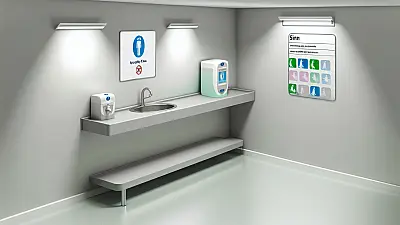WURTLAND, KY - A February 11 inspection at Wurtland Nursing & Rehabilitation revealed the facility failed to provide appropriate catheter care to prevent urinary tract infections in two residents, potentially exposing them to serious health complications.

Critical Catheter Care Failures
The inspection identified significant deficiencies in the facility's catheter management protocols for two residents who required urinary catheters. Both individuals did not receive the standard of care necessary to prevent or promptly treat urinary tract infections, a violation that carries substantial health risks for vulnerable nursing home residents.
Proper catheter care requires strict adherence to infection control protocols, including regular cleaning, monitoring for signs of infection, and timely intervention when problems arise. The facility's failure to meet these standards represents a fundamental breakdown in basic medical care.
Medical Significance of Catheter Care Violations
Urinary tract infections in catheter patients can rapidly escalate into life-threatening complications. When proper preventive measures are not implemented, bacteria can travel up the catheter and into the urinary system, potentially causing kidney infections, sepsis, or bloodstream infections.
Nursing home residents are particularly vulnerable to these complications due to their often compromised immune systems and underlying health conditions. The elderly population typically experiences more severe outcomes from urinary tract infections compared to younger adults, making prevention and early treatment critical.
Standard medical protocols require nursing facilities to maintain sterile catheter insertion techniques, perform regular catheter care, monitor for infection symptoms, and ensure prompt treatment when infections develop. These measures significantly reduce the risk of complications and improve patient outcomes.
Industry Standards and Proper Protocols
Federal regulations mandate that nursing homes provide each resident with the necessary care and services to attain or maintain their highest practicable physical well-being. For catheter-dependent residents, this includes implementing evidence-based infection prevention strategies.
Best practices in catheter care include daily cleaning of the catheter and surrounding area, maintaining a closed drainage system, ensuring proper positioning to prevent backflow, and conducting regular assessments for signs of infection such as fever, changes in urine appearance, or increased confusion in elderly patients.
Healthcare facilities should also have protocols for timely urine testing and antibiotic treatment when infections are suspected, as delays in treatment can allow infections to progress to more serious stages.
Health Consequences and Risk Factors
The consequences of inadequate catheter care extend beyond immediate infection risks. Untreated or poorly managed urinary tract infections can lead to recurring infections, antibiotic resistance, kidney damage, and increased mortality risk in elderly residents.
Catheter-associated urinary tract infections are among the most common healthcare-associated infections in long-term care facilities. When facilities fail to implement proper prevention and treatment protocols, residents face unnecessary pain, prolonged illness, and potential hospitalization.
Additional Issues Identified
The inspection findings reference additional deficiencies documented under F686, indicating the catheter care violations were part of broader care quality concerns at the facility.
The facility must develop and implement corrective measures to address these deficiencies and ensure all catheter-dependent residents receive appropriate care to prevent infections and maintain their health and safety.
Full Inspection Report
The details above represent a summary of key findings. View the complete inspection report for Wurtland Nursing & Rehabilitation from 2025-02-11 including all violations, facility responses, and corrective action plans.
💬 Join the Discussion
Comments are moderated. Please keep discussions respectful and relevant to nursing home care quality.